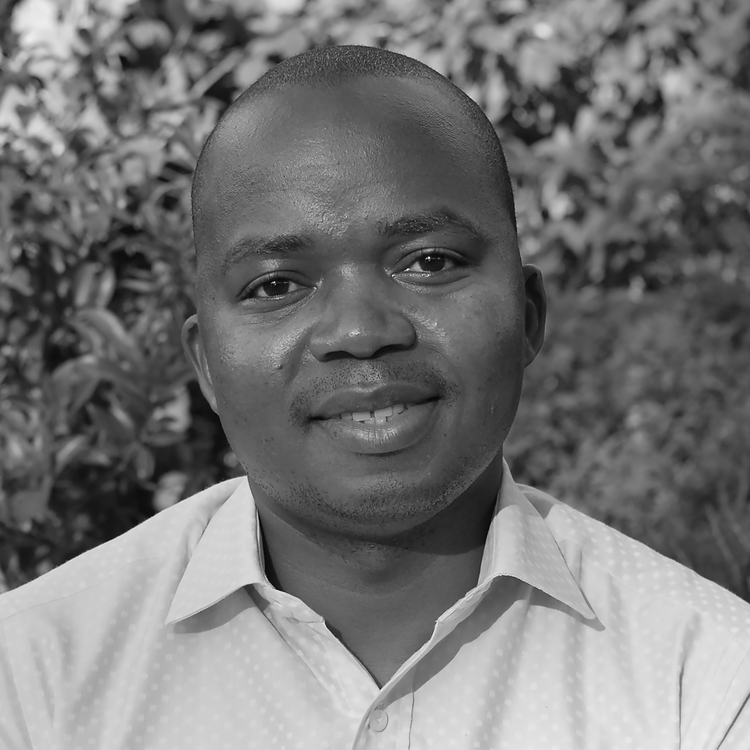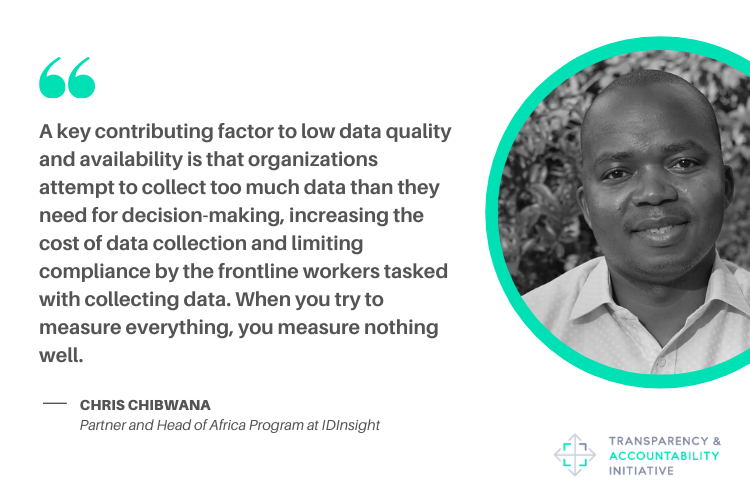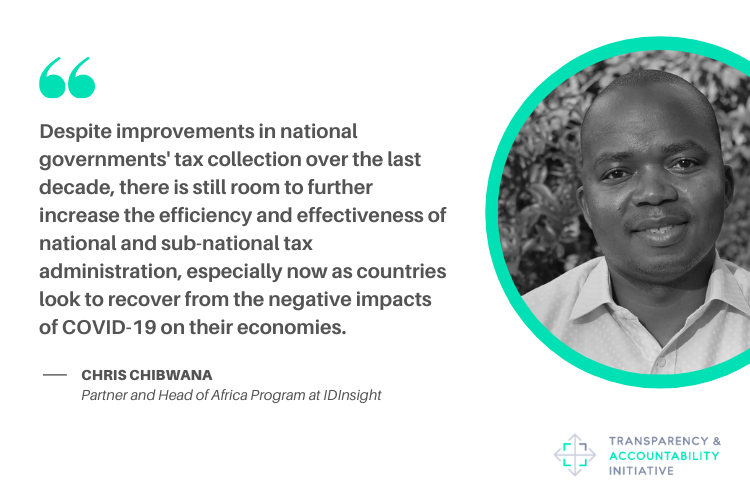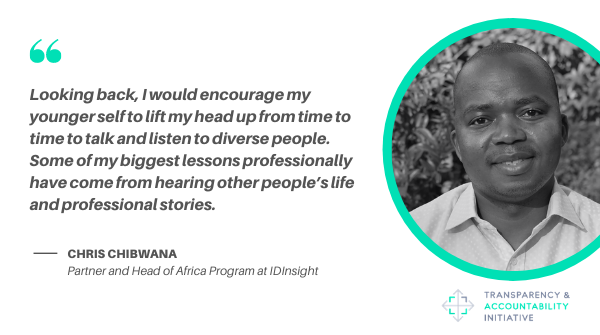
Chris Chibwana. Photo Credit: IDinsight
Chris Chibwana leads IDinsight’s partnerships with African governments and African philanthropy to support data-driven development on the continent. Prior to joining IDInsight, he worked with the International Institute of Tropical Agriculture, International Food Policy Research Institute, and USAID as a researcher on different data policy design and implementation.
In this interview, we discussed the nitty-gritty of using data for evidence and what progress looks like in the future for countries where unavailability and unreliability of data impacts decision making and development. According to Chris, “a lot of efforts to improve data availability and quality are still led by donors. Increased government leadership and commitment to making high-quality data available for decision making, transparency, and accountability remain a priority for Africa and the world.”
- Tell us more about yourself, and what motivated you to work on data for development impact?
I was drawn to data from a very young age. In primary school, my favorite subject was math. After undergrad, my first job was as a researcher for the International Institute of Tropical Agriculture (IITA) in Malawi. I enjoyed asking questions about how the improved agricultural technologies that IITA was disseminating impacted rural households and how they used data to answer them. I also briefly worked for the International Food Policy Research Institute, where I researched the impacts of Malawi’s Farm Input Subsidy Program on farmers’ livelihoods. However, I was discontented by what I noted as a disconnect between traditional policy research and policy practice, which pushed me to consider a role in program design and implementation at USAID.
When an opportunity arose to join IDinsight to work directly with decision-makers to use data to answer their questions on their own terms, I did not hesitate. At IDinsight, we pride ourselves in being tailored and demand-driven – using the same tools that I used in my previous career as a researcher to inform policymakers and program managers’ decisions within their time, budget, operational and political constraints. We do not define success as the number of publications that our staff publish. We measure success by the decisions and actions that our evidence informs.

- How is IDinsight making a difference in the transparency, civic participation, and accountability (TPA) field – especially in the use of data and evidence?
At IDinsight, we tailor a wide range of data and evidence tools, including randomized evaluations and machine learning, to help development leaders design effective programs and rigorously test what works to support communities. We work with governments, multilaterals, foundations, and innovative nonprofit organizations in Asia and Africa.
We are helping governments across Africa and Asia respond to their citizens’ needs by using data and evidence to inform the design and implementation of key development programs. Our partnerships are strengthening the capacity of government staff to demand and use data for decision-making. In Ghana, for instance, our team has been working with the Ministry of Monitoring and Evaluation to help them understand how flagship development programs such as Free Senior High School, One Village One Dam, and One District One Factory are being implemented and how they can be improved to ensure they deliver results for Ghanaians. In Malawi, we are partnering with the Ministry of Gender to ensure the effective delivery of unconditional cash transfers to 1.2 million Malawians.
We are also using data and evidence tools to capture and amplify citizens’ voice in decisions that affect them. Decision-makers in international development, from foundations to governments, frequently weigh complex trade-offs between different types of “good” outcomes. Governments in low-and middle-income countries must decide how to allocate funding across different ministries, and funders must decide which sectors, organizations, and interventions to prioritize. The preferences of individuals from low-income communities — those on the receiving end of the hundreds of billions of dollars of development — are rarely brought into these decisions. We recently listened to communities in Kenya and Ghana about what types of development assistance they preferred. GiveWell used the results to inform their resource allocation decisions.
We are now actively exploring opportunities to use our broad quantitative skill set to support decisions by revenue authorities. Despite improvements in national governments’ tax collection over the last decade, there is still room to further increase the efficiency and effectiveness of national and sub-national tax administration, especially now as countries look to recover from the negative impacts of COVID-19 on their economies. We see opportunities to use our tools to help national and subnational government authorities to increase tax and customs compliance, provide greater transparency to taxpayers, and develop the empirical basis for more equitable tax regimes and administration. We believe rigorous evidence and data can help decision-makers assess and further strengthen the various dimensions of tax and customs systems, contributing to larger tax bases, better risk management, and increased revenue generation.

- Lack of reliable data and statistics has been a persistent problem in many African countries. How is IDinsight stepping up to this challenge? What would progress look like for Africa and the world in general in the near future?
The factors contributing to the dual problem of unavailability and unreliability of data in Africa are not just technical, they result from implicit and explicit incentives to use data for decision making. The UN Data Revolution Group and the World Bank both emphasize endemic data quality shortcomings at national levels. This is consistent with IDinsight’s direct experiences across the continent, which have revealed serious data quality obstacles when we have attempted to analyze data provided by the government, nonprofit and philanthropic partners.
We are working to address the incentives that limit data use by government, nonprofit, and philanthropic partners. In most contexts, we are stimulating demand for high-quality data by demonstrating to our partners the power and value of good data. We have done this by presenting data to key decision-makers in an appealing, intuitive, and relevant decision-making format. Through our projects, we have seen how much decision-makers engage with maps and other simple graphic visualizations of data. Once decision-makers recognize the value of good data for decision-making, organizational investments in improving data availability and quality become possible.
A key contributing factor to low data quality and availability is that organizations attempt to collect too much data than they need for decision-making, increasing the cost of data collection and limiting compliance by the frontline workers tasked with collecting data. When you try to measure everything, you measure nothing well. We help our partners streamline data collection by focusing only on collecting data that is directly relevant for decision making.
Our survey-based data quality know-how has also proved useful when applied to our partners’ existing administrative data systems. On the technical front, we have developed a range of innovations that increase data quality. Among others, we have developed a comprehensive set of automated data quality checks that do not require human intervention, scalable systems that process high-volume data flows in real-time, and rapid deployment of data quality systems in hours rather than weeks for original data collection efforts. We are pushing the bar on data quality by introducing practices that are not yet common in these settings, such as spot checks, backchecks, audio audits, and machine learning data quality algorithms that efficiently identify and correct erroneous data elements. Beyond these technical innovations that help assess data quality, we provide practical managerial and organizational guidance on how best to train, manage, and incentivize quality frontline data collection and use to improve data quality.
IDinsight is working to revolutionize data collection by creating a menu of options that provide data to clients radically faster and less expensively. Our Data on Demand Initiative in India is being used to continuously gather data representative of ~300 million of India’s poorest citizens for India’s national government and other NGO and philanthropic partners. Data on Demand works through a network of trained and experienced surveyors that can be rapidly deployed to execute data collection tasks within a short distance of their home. In two years, we have gone from proof of concept to collecting data on how well public services are being delivered to millions of people in health, nutrition, sanitation, education, agriculture, and finance. Data on Demand demonstrates that high-quality data in almost any sector can be generated quickly, cheaply, and flexibly.

I am encouraged by the progress that governments across the continent have made in investing in national data systems. Several African governments are members of the Global Partnership for Sustainable Development Data and the Open Government Partnership, which have offered incentives to share data and, therefore, invest in improving data availability and quality. However, at the country level, a lot of efforts to improve data availability and quality are still led by donors. Increased government leadership and commitment to making high-quality data available for decision making, transparency, and accountability remain a priority for Africa and the world.
- What do grantees want from funders in regard to having a smarter grantmaking relationship?
Grantees need more than money from funders – they need thought partnership. Having previously worked for a funder, I realize that I had a perspective that I had gained from interacting with other funders and grantees, which some of my grantees did not have. Because I was not involved in the day-to-day running of an organization or a program, my external perspective was often valued by the grantees I worked with. In my current role leading a nonprofit, I have been fortunate to work with program officers that have enriched my strategic vision and execution by asking questions, sharing experiences from other grantees, and making connections with other like-minded organizations.
Grantees also appreciate funders that are flexible. This has particularly been important this year where many grantees have struggled to meet performance targets set pre-COVID. Our funding partners’ allowing us to pivot our work plans when the pandemic started enabled us to be relevant and respond to the changing needs of organizations that we support. Finally, as a grantee, I have appreciated funders that have lowered our burden by simplifying grant application and reporting requirements and processes.
- What recommendations will you give your younger self or anyone starting out to work in the TPA space?
I started out as a researcher, which meant that I read a lot. I read other people’s work to identify how my research fits in. I read to learn methods that would be useful for my work. I read to critique and identify weaknesses in other people’s work.
Looking back, I would encourage my younger self to lift my head up from time to time to talk and listen to diverse people. Some of my biggest lessons professionally have come from hearing other people’s life and professional stories. The second recommendation I would give my younger self would be to embrace my own story and not shy away from sharing it with others. I have learned that vulnerability breeds empathy and trust.


